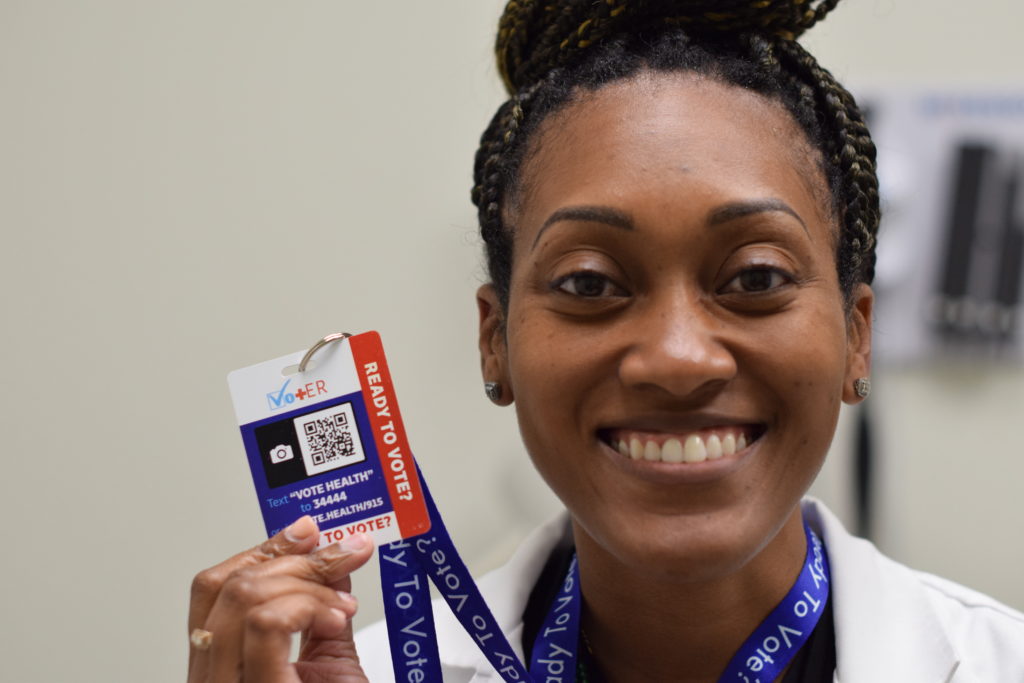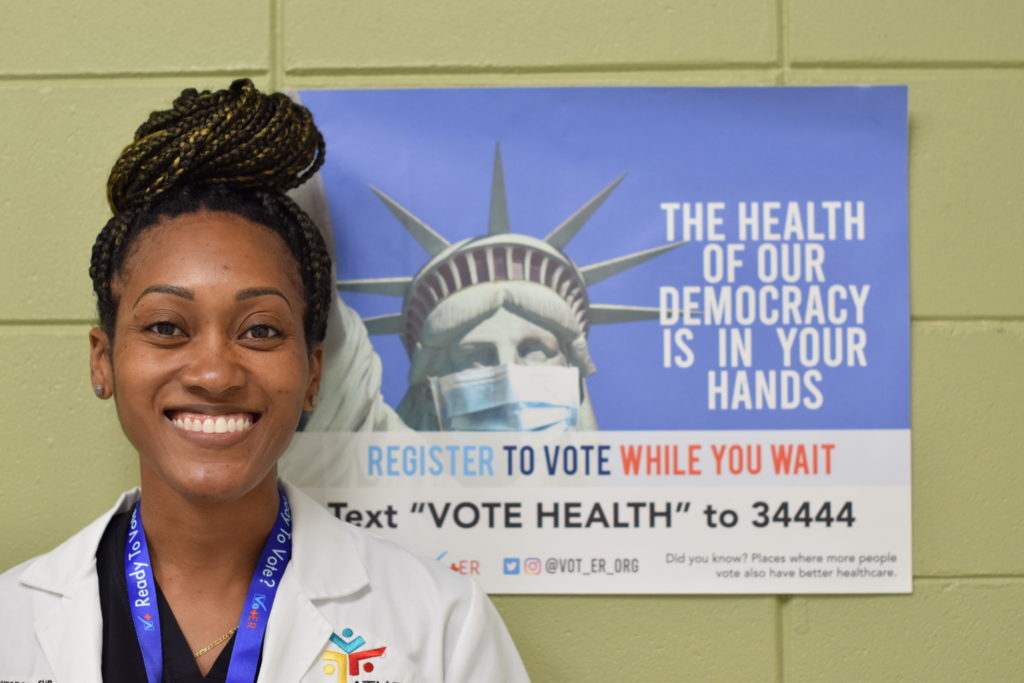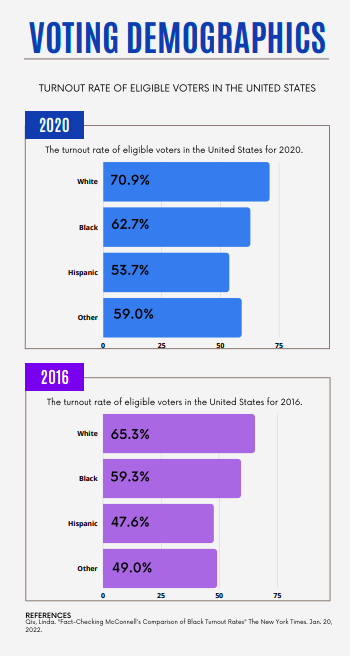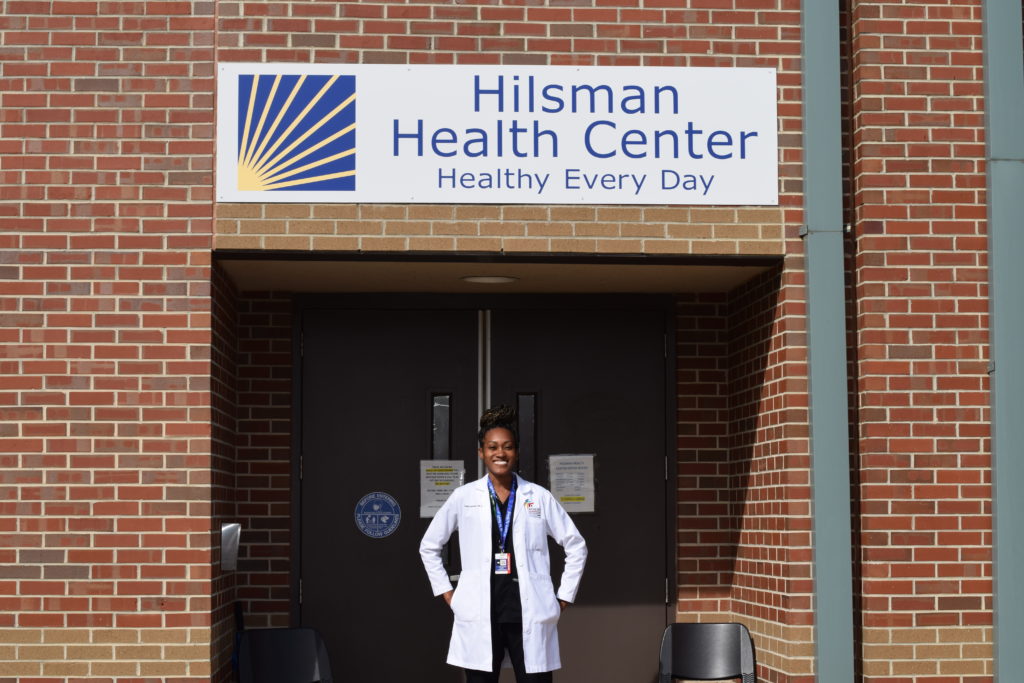
Hilsman Health Center impacts healthcare policies through voter registration
Nestled in the back of the Hilsman Middle School gym, the Hilsman Health Center has a new and uncommon mission: helping patients register to vote. Partnered with the voter registration initiative Vot-ER, family nurse practitioner Tionya Lawrence is working to help patients have more control over policies impacting their health.
“My short term goal is to see Vot-ER blow up in the Athens community, having other healthcare workers create a healthier and more inclusive democracy. It’s nonpartisan, it’s not pushy, but the work that Vot-ER does is directly impacting change, and it can directly impact the health and longevity and prosperity of our patients,” Lawrence said. “People may say, ‘How can I do this? Is this legal?’ Absolutely. In the Voting Rights Act of 1993, they allowed for healthcare workers and large institutions to register people to vote.”
Becoming affiliated with Vot-ER is simple. Healthcare providers can go to the Vot-ER website and order informational posters and a free badge with a QR code. Then healthcare providers talk to their patients about registering to vote, and if they are receptive, patients scan the QR code with their phone, taking them to a voter registration website. When Lawrence, who works at both the downtown Athens Neighborhood Health Center and the Hilsman Health Center, heard about the program from a colleague, she knew she had to get involved.

“I discovered that it was an awesome movement, and I took it a step further by ordering myself a badge and then becoming a member of their inaugural Civic Health Fellowship,” Lawrence said. “Even before Vot-ER, ensuring voter equity was something that was super important to me because we see so many people affected by the laws and policies that are put out, and often those are the individuals that don’t vote.”
When the Hilsman Health Center was first created, it only served students and staff from Hilsman and neighboring Gaines Elementary School. However, at the start of the COVID-19 pandemic, the clinic opened its doors to the Athens community during times when school was not in session. If Lawrence is treating someone 17 and a half or older, she asks them whether they are registered to vote.

“The people that are most marginalized by the healthcare system, if you created a venn diagram, they are my patient population. They all fall in the middle of being young, low income and people of color. So, I talk about how voting affects policy and how policy affects you,” Lawrence said. “Usually, once you break it down like that, more people are more apt to register.”
Emergency medicine physician and Vot-ER’s founder, Dr. Alister Martin, started the program after seeing countless people coming into hospitals due to failed policies.
“The patients that are the least likely to vote, or the patients who are voting less and on smaller scales are the ones that are most marginalized by the healthcare system today. Just like Dr. Alister Martin said, you can come into my office and I can diagnose and I can prescribe but there’s no prescription for poverty. There’s no prescription for inequity. There’s no prescription for inadequate housing, so that is why I hope I speak on his behalf,” Lawrence said.
Having the right to vote is not something that Lawrence takes for granted. Having conversations with relatives like her grandmother that didn’t have that freedom pushes her to be involved by helping others understand the power of voting.
“I saw this as a chance to not only exercise my right but also exercise the privilege that so many people before me have worked so hard for me to obtain,” Lawrence said. “I know a lot of times people deal with voter apathy, or ‘My vote doesn’t count,’ or ‘Why does it matter?’ Those are some of the things that I try to try to dispel. So many elections are won by a small margin, so your vote does count, especially in smaller local elections. In your community, where the money goes for schools, where the transportation, where the districts are drawn, those are things that directly impact you.”
Lawrence points to a lack of access and education as driving forces in preventing older individuals from voting.
“I am looking forward to following up with one of my patients. She’s a mid 60s African American woman and she had never voted in any kind of election. For me, that was a powerful moment because other people may have assumed that she had,” Lawrence said.

Vot-ER is not slowing down. With more than 80 medical schools competing for the most registrations, 25,000 healthcare workers requesting a badge and 40,000 people starting their registration process, Vot-ER’s impact is continual. Going forward, Lawrence knows that the only way to change people’s attitudes toward voting is to change the atmosphere in which it is discussed.
“When you’re looking at a ballot that is in your neighborhood or your city or state, you can directly see how that will affect you and your family, neighborhood or community,” Lawrence said. “As a healthcare provider using this platform with other healthcare workers, we see that the benefits of voter engagement provide an increased chance of longevity, lower rates of anxiety and depression, higher self esteem and empathy, better emotion and regulation skills and those are the things that are created with voter and civic engagement and social connection.”



